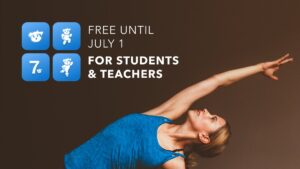Zoomed out
It has been nearly a year since the world turned upside down and sent most employees
and nearly every student in the world to an online format. It was a new way of learning that came with many pros and many cons.
One of the cons is known as Zoom fatigue – and it’s real.
“I think it’s affecting every human being, adults, professors, faculty, staff, administrators, students – yes absolutely,” said Martha Coulter, Wellness Center director at Castleton University.
According to the Psychiatric Times, “Zoom fatigue describes the tiredness, worry, or burnout associated with overusing virtual platforms of communication.”
“I definitely know it’s an issue,” said Jennifer Jones, director of the Academic Support Center at Castleton.
Allison Andrade is a junior at Castleton majoring in biology and she said Zoom life is tough for her.
“It’s very exhausting to sit there and just have to pay attention … It’s definitely more of a challenge to focus,” she said.
She is taking five classes online this semester and does not believe that online classes are contributing to her learning as they should. A lot of the classwork is just busy work for the professors to put grades in, she said.
Andrade said online exams are harder for her due to her test anxiety and she isn’t always able to complete them without the ability to ask questions and they have strict time limits.
However, unlike in-person classes, she is able to review lectures once they are recorded and pause them or rewind them to get all of the content that her professors are delivering, she said.
Many students are experiencing Zoom fatigue symptoms, even if they don’t know the term Zoom fatigue, Jones said. But Castleton officials and students say there are ways to combat fatigue.
Professor Michael Talbott is the Media and Communication Department chair, who also is enduring Zoom overload.
“I can tell you that there are days that I spend more than 10 hours in Zoom. It’s exhausting,” he said. “It physically takes a toll on your eyes.”
Talbott went to his eye doctor over the summer due to the strain he had noticed on his eyes. The response he got surprised him as the doctors told him his vision was perfect and that he didn’t need glasses.
Talbott said to combat eye strain, he found an app called F.lux, available for computers and phones, that adjusts the screen temperature and harshness to mimic the room you are in according to its website.
And Coulter suggested a free yoga app the school is offering to get people away from the screen and improve their mindset.
“I’m always paying attention for free resources for students and it’s a really good yoga app,” she said.

Down Dog is offering a free subscription to all college students and staff to their yoga, meditation, HIIT and other health apps. All you have to do is signup with your Castleton email.
Andrade found that changing the Dashboard page on Canvas from a card view to a list view has shown great success for her weekly planning.
“It will lay everything out for the week and what day everything is due, and it has been a true-lifesaver!”
The change is very easy and done by clicking on the three dots in the top right-hand corner of the screen when you are on the Dashboard or opening page of Canvas.
But Zoom learning has offered opportunities too.
Talbott said he has seen increased retention of information in a majority of his students throughout the course of the semester.
“It’s easier to log into Zoom and log into Canvas to do some work. It’s harder to drag yourself out of bed and come to a class if you are feeling unmotivated,” he said.
Coulter agreed, saying, “some students learn really well, and they excel while some students have a really hard time.”
Cannon Blanchard is a senior who studies exercise science and said his online classes are “just like every other class I’ve had.”
He believes he’s lucky, as a senior, to have the same professors and classmates from previous classes. This makes his classes on Zoom very comfortable and interactive.
On the other hand, Andrade said she lacks that connection with some of her newer professors.
“You can’t really establish that small-school relationship with them,” she said.
Hanna St. John is a first-year student who deferred in the fall due to the stigma of taking online classes. Although they aren’t as bad as she originally thought, she does agree it’s much harder to concentrate online.
“Sitting at my desk in my room to do school is such a different environment,” she said.
To combat the fatigue of her Zoom classes, Andrade said she goes to different areas on campus including the library or common areas.
“I like to change it up and look at the different scenery around me and I’m not just feeling like a caged animal in my room,” she said.
She also believes in utilizing campus resources to help her.
“I am a regular at the Wellness Center,” she said. “It just helps me clear my mind and get things off my chest.”
Gerry Volpe, coordinator of Disability Services for the Academic Support Center, is a strong believer in “camera breaks.”
He said that just turning your camera off for a few minutes to take a breath, drink some water or even stand up at your desk to look at something different can significantly improve the anxiety students feel.
Coulter agrees.
“Move as much as you can,” she said. “Get away from a screen and out of your chair.”
Talbott said that he believes, despite the use of Tik Tok and social media that we use to
chill-out, that it is necessary to go for a walk or read a book and stay away from screens when they aren’t necessary.
The Academic Support Center is still open, and even though the services are online, there is still a quiet lounge to study in and computers to use there, Jones said, as students worked nearby
“If you’re not sure where to go, this is a great place to start,” Jones said. “We deal with not just with academics but serve the whole student.”








